Spanish international ‘Manuel Botubot’ was a key Valencia CF defender for eight memorable seasons and a favourite of the Mestalla faithful too. Tall, strong in the air and as tough a defender as they come…Botubot was part of the valiant Valencia CF side of the late 1970s/early 1980s that won the ‘Copa del Rey’ against Real Madrid, ‘Cup Winner’s Cup’ against Arsenal and ‘European Super Cup’ against Nottingham Forest.
24/7 Valencia: You shared the pitch with some of the game’s greats, what was it like facing a young Diego Armando Maradona? Was he the player we saw in the 1986 World Cup, or was he still quite raw when you played against him?
MANUEL BOTUBOT: Diego Armando Maradona was a footballing genius. As a team, Valencia CF played a pre-season friendly, in northern Europe, against the ‘junior’ Argentine international side with Maradona in the team. That was the first time I played against Diego Maradona and got to know just how well he played football too. At that time, the German footballer Rainer Bonhof was playing for Valencia. On top of that, Bonhof was marking Maradona and I asked him how he found the experience. Bonhof told me that “Maradona is the best footballer I have seen play on a football pitch… and the most difficult player to mark too!”
We had already heard about Maradona’s reputation beforehand and were expecting something special… but it is another thing to see him in-the-flesh, in action on the pitch and to play against him too. It was a wonder to see the technical skill with which he controlled the ball, he was a “mago”(magician). In Spain, I did mark Maradona in matches in LaLiga and realized the “fragilidad” (fragility) of his situation playing football on the pitch… given that he was being marked by players who were new to his style of playing football. Maradona was doing many “new things” with the ball, which he had actually invented himself. Marking Maradona in Spain, I literally saw him doing things with the ball that I had never seen before on a football pitch.
Sadly, I have seen uncomfortable matches on television where Maradona was playing for Barcelona FC against Spanish or English or French sides. The fouls that were committed against him were appalling. These days, those kind of tackles would be straight red cards but it wasn’t like that back in those days! It pained me to watch the type of “rugby tackles” they committed against Maradona on the football pitch…it was ‘escalofriante’(chilling).
Speaking for myself as a ‘viril’ (virile) defender back in the day, I was a very tough marker and I was always a strong player in the tackle too… but always ‘limpio’ (clean) and very professional in my way of playing football and without the intention of causing harm to others. Indeed, I would sometimes get the bruises that the opposition players could have received…because my way of playing was ‘limpio’ (clean) and honest.
You also faced Allan Simonsen when he was with FC Barcelona. Was he a genuine European Player of the Year? Do you think he deserved the award?
I knew Allan Simonsen as a footballer and personally too, as we had friends in common. My teammate Rainer Bonhof was a really good friend of Simonsen. From time to time, we would all meet in Marbella to play golf…along with a German goalkeeper from Simonsen’s Bundesliga days. I played in a match against Simonsen when FC Barcelona played Valencia CF and he got injured in that match. Simonsen was small and slim and quick…rather like a mouse on the pitch. He had really good ball skills and a low centre of gravity, which made him quite fast and ‘elastico’ and dangerous for the opposition regarding key moments in a match. He had great technical skills and could be spectacular on the pitch. Most of all, Simonsen was a ‘caballero’ (gentleman) on the football pitch. Yes, Simonsen clearly deserved his ‘European Player of the Year’ award on merit… for being a great footballer but also for being a decent person and for what he did for football on a national and international level.
During that time in LaLiga, who was the centre-forward who gave you the most problems?
There were various players who gave me problems for their underhand way of playing football. Top of the list would be Rubén Cano of Atlético Madrid (“a sporting enemy”) and the Mexican player Hugo Sanchez who became a Real Madrid player…and who brought out his “mala ser” (bad side) and tough nut way of playing football. Indeed, my ear was partly torn by a “scissors-kick” shot that Hugo Sánchez attempted when he made contact with my head instead of the ball in the six-yard box! I was just trying to clear the ball and I still have the scars to this day from that injury. The referees gave Sánchez far too much liberty, in those days, for things like that.
I also played against Butragueño who was a real gentleman on the pitch; someone would rather get on with the match and get on with you instead of taking advantage of a 50-50 tackle and inventing stuff to dupe the referee…the complete opposite of Cano and Sánchez!
Was it always Valencia for you? Did you ever receive offers to leave before you eventually did for Castellon? Did playing abroad ever interest you?
I was never offered to leave when I was at Valencia CF because I always had long contracts…3 or 4 or 5 year contracts. It is not like these days with so much comings and goings, regarding players being bought and sold at the drop of a hat. On top of that, I was really happy at Valencia. However, it has to be said, I always liked English football. I would have liked to have played for an English club…the style of play suited me, the ‘ambiente’ (atmosphere) in the stadiums too.
You won one Spain cap – and it was against Italy and the likes of Rossi and Tardelli. Do you treasure that cap? Do you think you deserved more chances with Spain?
Obviously, I do believe that I deserved more caps as a central defender or left back for Spain, these were positions I also played for with Valencia CF. I was actually selected 8 times to play for Spain but the manager tended to prioritise certain substitutes, if the goalkeeper got injured (for example) and his first choice for my central defender position was a player from FC Barcelona called ‘Migueli’ who played many times in my position. So, I was often on the bench. Therefore, that made it difficult for be chosen and it limited my possibilities of playing on the pitch more times.
Tardelli was playing in another part of the pitch so I didn’t get to know him so well in that match but I had to mark the area that Paolo Rossi was moving in and I found him to be a footballing ‘caballero’ (gentleman) when marking him. This is not something you would realize if you saw him playing on television but only if you played against him in person …and you realized he was actually a noble player on the pitch and in the field of play…as I did.
In Europe, you tussled with some great English teams. In general, was there a different style being played in England compared to what you were used to in Spain? How did you combat it?
With the exception of, Real Madrid and maybe FC Barcelona and perhaps ‘El Valencia’ (Valencia CF) of that epoch… all the other Spanish sides actually played in a similar way to the English sides, it was more or less the same. Characteristically, the English way of playing football has always put a lot of emphasis on physical strength and it wasn’t about moving the ball in a fancy way on the pitch, it was more about getting the ball up field for crossing centres in the air for headers. The pitches were bad and the rain was the same in both countries! (Laughs)
These days, they play the same kind of football in Spain as they do in England and the technical skill of the players has got a lot better too. The quality of the football has got much better in both countries. The football has improved a lot in both countries… partly because the pitches are much better too.
Can you recall facing Cyrille Regis and Laurie Cunningham against West Brom? What was it like facing big Cyrille? After facing Cunningham, could you see him eventually joining Real Madrid?
To a certain extent, I marked Laurie Cunningham in the Valencia home match at Mestalla and our left back José Cerveró marked Cunningham in the second leg in West Bromwich and our right back was Carrete.
The away match was really difficult as West Bromwich were a really tough side (with big central defenders) and gave their all and got the better of us on their home turf on that day. However, we were equal to them in the match in Spain.
Regarding that tie, the West Brom manager Ron Atkinson said about me: “That Valencia defender Manolo Botubot is a really big lad with an even bigger heart.” I’m still not sure if Ron Atkinson was being sarcastic or playing me a compliment! I think he was saying that I had a very, very good game and got stuck in and didn’t shy away from tackles. It was an intense UEFA cup tie over 2 matches. West Brom were a really strong side.
I remember Cunningham as being really small and very slim and very skilful and very quick. You could he was going to be involved in bigger things, regarding clubs in the future.
Regarding Cyrille Regis, I remember him being very tall and very strong and fast and more physical in his approach. Regis was a “potente” player. He was always looking to get in a good position and to get a header in to help his colleagues on the pitch and he would use his elbows if he needed to gain territory. As a central defender, I was used to this sort of physical game. In the old days, centre-forwards were much more like that than they are now.
In that West Brom team was a young Bryan Robson, who you also faced as a Man Utd player. Can you recall facing him? Did he play like a record 1.5m signing at the time?
Yes, I remember Bryan Robson. He was very skilful with a lot of physical strength. A tough player to play against. I marked Bryan Robson over both ties and he made me work a lot as he wasn’t just good with his feet, he was strong in the air too…so he seemed to be taller than he actually was. At Valencia CF, our central defenders (myself, Ricardo Arias or Miguel Tendillo) made sure to double mark individual players like that…with one central defender in front and one behind.
Of course, you faced Frank Stapleton and Norman Whiteside in that UEFA Cup tie – having also faced Stapleton in the Cup Winners’ Cup final against Arsenal. Do you think you had his measure?
Frank Stapleton was a player who I was more comfortable playing with when he was going forward as a centre-forward …than when he was pulling back and causing trouble for us defenders. For me, he was more dangerous on the wing than as a centre-forward. To get at him, as a central defender, I had to go out on the flank and that would leave my area vulnerable in the centre. I had to alternate with the left backs and right backs, Carrete and Cervero, to deal with Stapleton!
The best player I remember for Arsenal in that Cup Winners’ Cup final was Graham Rix. He had an agility and control of the ball that was really impressive. And yet…he missed the key penalty in the shoot-out after extra-time. I remember he tried to feign our goalie to confuse him regarding which way he was going to shoot the ball… but, in reality, our goalkeeper outwitted him and guessed the right way and Valencia won the final!
By the time Frank Stapleton was at Manchester Utd, I had the measure of him and the way he played.
Regis, Stapleton… was there a difference facing British centre-forwards at the time compared to what you encountered in LaLiga? Did they present a different challenge?
In Spain, with the exception of a few strikers who pulled back, most Spanish forwards were classic ‘number 9’ centre-forwards. It was just the same in England. There weren’t these “False 9” players who played from midfield as you have now. At that time, the defences in England were also very similar to how we played in Spain…regarding most clubs, generally speaking. They also were trying to get the ball upfield so that their wingers and all their other players could get the ball to their centre forward. I always liked English football because it was played in the style that I understood football too. It was familiar to me.
Have you followed Pau Cubarsi’s breakthrough at Barça? What do you make of him? Where do you think he can improve?
He’s going to do well if he continues as he is. We’re talking about a player who is only 17 years old! With the exception of Maradona, Pele and Messi…no-one is doing that at that young age now. He is already playing in LaLiga infront of really large crowds. You have to have a lot of mental toughness at that age to not be nervous on the pitch and to focus and play well too. You are born with that attitude, it’s not something that you learn…it’s innate. I like the fact that as a player, he is serene and ‘tranquilo’ on the pitch, he keeps his wits about him and he is great going forward too. Actually, he’s exactly the same height as me (1.84cm) so he has presence too.
Both Aymeric Laporte and Robin Le Normand went to the Euros with Spain, yet they could easily have committed to France. Is it just coincidence, or is something failing in the Spanish system regarding centre-backs? Do you think Spain are short of centre-backs at the moment?
In my opinion, central defenders of today are really not at all what they were in my day. In the past, central defenders were there to intervene, to tackle, to get the ball and pass it on. Now, a central defender is like another player on the team and not so easily defined regarding his role. However, I do believe that Aymeric Laporte and Robin Le Normand are worthy of playing for Spain; they both have the capability required at a national level. Yes, Spain is lacking central defenders. However, we do have four or five really good central defenders and one solution is to have more left backs and right backs adapting to being central defenders too. Indeed, in the modern game even goalkeepers now are supposed to be good with their feet and almost be like defenders too!
Rudiger? Dias? Van Dijk? Who do you rate as the best centre-back in the world right now? Why?
I would choose Rudiger. He is a great centre-back, he is strong and decisive on the ball and he knows what he is doing when the ball is at his feet and he is calm too. He is also good in the air.
Who are the centre-backs in today’s LaLiga who impress you?
I like Mosquera who played at Valencia CF and is now at Arsenal, I like his way of playing. What he was lacking is somebody to back him up since the Paulista left Valencia. For FC Barcelona, I like Jules Koundé as he is also a versatile defender. For Real Madrid, I like Éder Militão…who is their key centre-back who can also play as right-back. In his day, Sergio Ramos was one of the best centre-backs in Europe with great positioning. However, like a great car with great motor…the miles add up and everything has its day.
Luis Enrique was highlighting the dominance of Spanish coaches in Europe. A coincidence or is there something about the Spanish system which produces the likes of Emery, Xavi and Enrique?
Spanish football and European football in general has changed a lot over the years. The concepts that football managers now have are not the concepts that managers had back in the old days. Managers now have to understand the needs of the players. To give you a comparison, how my father brought me up cannot possibly be the same as how fathers are now with bringing up their sons.
No matter how good a manager may have been as a footballer, he now has to understand the players and the new concepts and philosophy of football that young players are dealing with in the game of professional football and also care about the players’ demands and needs and wants. These days, it’s more important to be a good psychologist than it is to be a good football manager.
What is good regarding these managers (Emery, Xavi, Enrique) is that they have learnt positively about what happens on the pitch when they too were once players and are applying well their own knowledge and experiences as footballers to their own players… now that they are managers. It is no coincidence that they have become successful as managers. It’s a question of education and respect. I think in the old days, the managers didn’t really respect the players much. Managers tend to be idolized more in the past. These days, I don’t see those kind of football managers anymore. Now, football managers have to understand and care for their players and be on the same page as them. In Spanish, we would say “mima” which is to “indulge” their players (like parents do to their children) and to be on a good footing with them too.
What have you made of this Peter Lim era? Can Valencia ever get back to being a title challenger with Lim in charge?
It depends on the players as a team and not Peter Lim. Also, I think Mamardashvili was definitely one of the best goalkeepers in Spain. However, he needed to be more decisive in his decisions sometimes. A great goalkeeper cannot be doubtful and speculate about his decisions; he needs to know instinctively what to do in any given moment… so that making the right decision becomes second nature. He is now at Liverpool. In general, a footballer has to be decisive otherwise you lose the match. You have to forget everything when you are out on the pitch that is a distraction…including that 50, 000 people are watching you…otherwise you freeze and you won’t be playing at your best.
Have you had a good look at Cristhian Mosquera? What have you made of his progress?
He’s a young lad who seems wiser than his age and seems to play with more experience than he actually has. He’s intelligent and he never complicates things on the pitch. He does what he has to do and, technically, he has a lot going for him too.
Interview by Will McCarthy
Article copyright ’24/7 Valencia’
Related Post
This site uses Akismet to reduce spam. Learn how your comment data is processed.


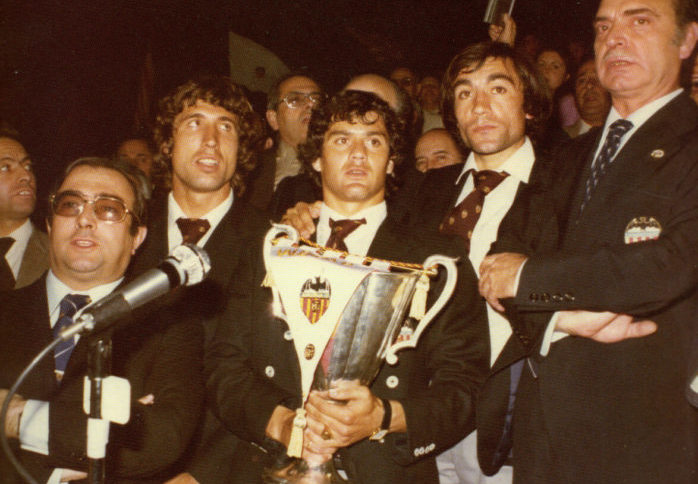
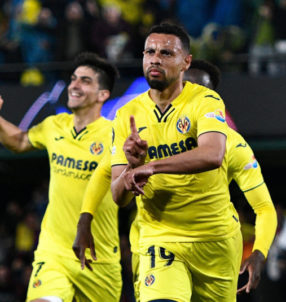
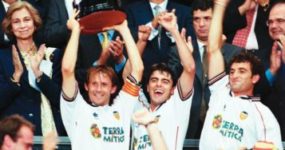
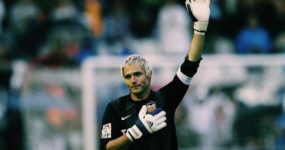
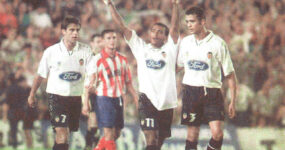


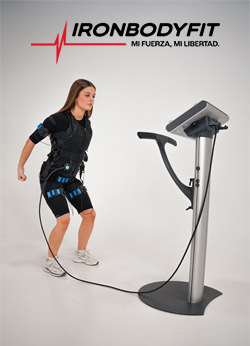
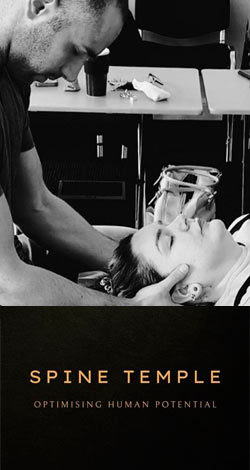















Leave a comment